最难发音的英语单词如何正确发音
最难读的英文单词是什么
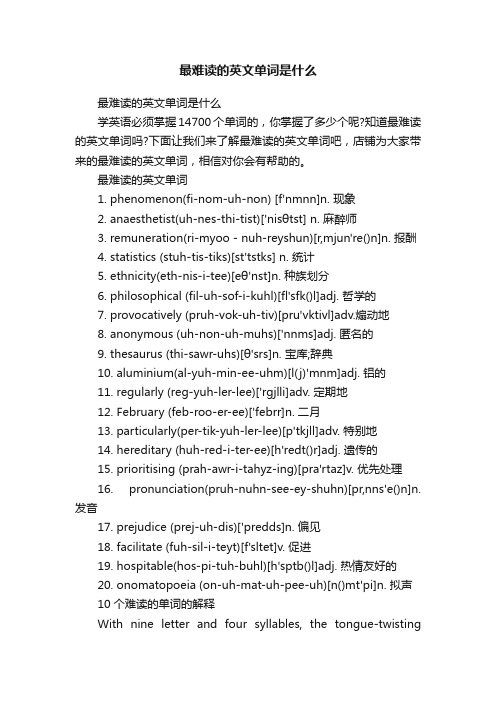
最难读的英文单词是什么最难读的英文单词是什么学英语必须掌握14700个单词的,你掌握了多少个呢?知道最难读的英文单词吗?下面让我们来了解最难读的英文单词吧,店铺为大家带来的最难读的英文单词,相信对你会有帮助的。
最难读的英文单词1. phenomenon(fi-nom-uh-non) [f'nmnn]n. 现象2. anaesthetist(uh-nes-thi-tist)['nisθtst] n. 麻醉师3. remuneration(ri-myoo - nuh-reyshun)[r,mjun're()n]n. 报酬4. statistics (stuh-tis-tiks)[st'tstks] n. 统计5. ethnicity(eth-nis-i-tee)[eθ'nst]n. 种族划分6. philosophical (fil-uh-sof-i-kuhl)[fl'sfk()l]adj. 哲学的7. provocatively (pruh-vok-uh-tiv)[pru'vktivl]adv.煽动地8. anonymous (uh-non-uh-muhs)['nnms]adj. 匿名的9. thesaurus (thi-sawr-uhs)[θ'srs]n. 宝库;辞典10. aluminium(al-yuh-min-ee-uhm)[l(j)'mnm]adj. 铝的11. regularly (reg-yuh-ler-lee)['rɡjlli]adv. 定期地12. February (feb-roo-er-ee)['febrr]n. 二月13. particularly(per-tik-yuh-ler-lee)[p'tkjll]adv. 特别地14. hereditary (huh-red-i-ter-ee)[h'redt()r]adj. 遗传的15. prioritising (prah-awr-i-tahyz-ing)[pra'rtaz]v. 优先处理16. pronunciation(pruh-nuhn-see-ey-shuhn)[pr,nns'e()n]n. 发音17. prejudice (prej-uh-dis)['predds]n. 偏见18. facilitate (fuh-sil-i-teyt)[f'sltet]v. 促进19. hospitable(hos-pi-tuh-buhl)[h'sptb()l]adj. 热情友好的20. onomatopoeia (on-uh-mat-uh-pee-uh)[n()mt'pi]n. 拟声10个难读的单词的解释With nine letter and four syllables, the tongue-twisting'phenomenon' has been named as the most mispronounced word in the English language.“phenomenon” 这一单词有9个字母4个音节,发音十分拗口,也被名副其实地评为英语中最容易发错音的单词。
中国学生最容易读错的英文单词
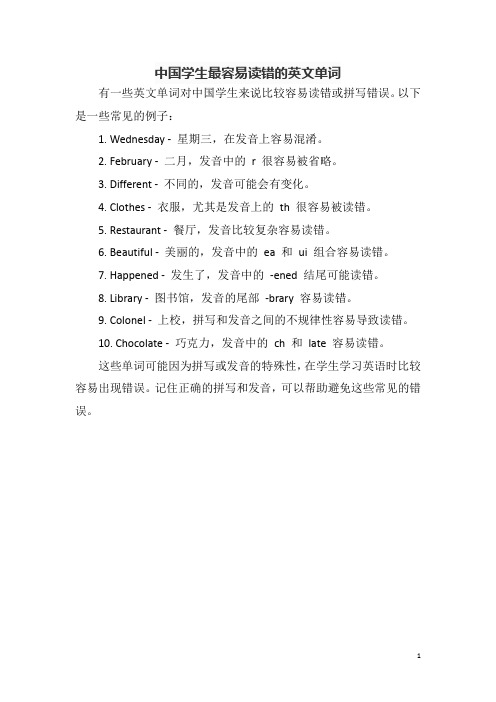
中国学生最容易读错的英文单词
有一些英文单词对中国学生来说比较容易读错或拼写错误。
以下是一些常见的例子:
1. Wednesday -星期三,在发音上容易混淆。
2. February -二月,发音中的r 很容易被省略。
3. Different -不同的,发音可能会有变化。
4. Clothes -衣服,尤其是发音上的th 很容易被读错。
5. Restaurant -餐厅,发音比较复杂容易读错。
6. Beautiful -美丽的,发音中的ea 和ui 组合容易读错。
7. Happened -发生了,发音中的-ened 结尾可能读错。
8. Library -图书馆,发音的尾部-brary 容易读错。
9. Colonel -上校,拼写和发音之间的不规律性容易导致读错。
10. Chocolate -巧克力,发音中的ch 和late 容易读错。
这些单词可能因为拼写或发音的特殊性,在学生学习英语时比较容易出现错误。
记住正确的拼写和发音,可以帮助避免这些常见的错误。
1。
最难发音的10个音标
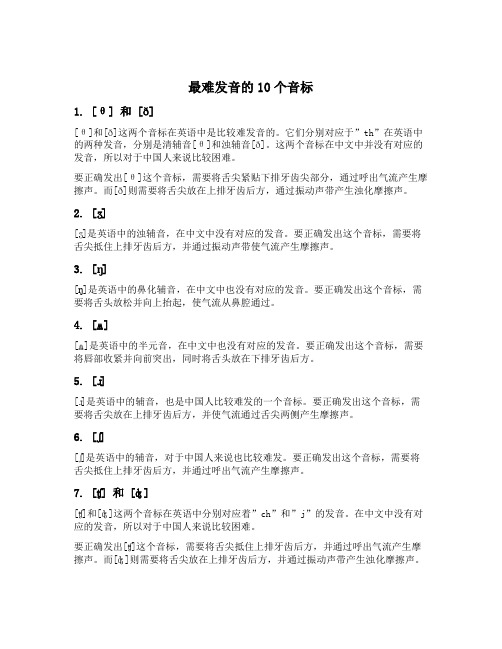
最难发音的10个音标1. [θ] 和[ð][θ]和[ð]这两个音标在英语中是比较难发音的。
它们分别对应于”th”在英语中的两种发音,分别是清辅音[θ]和浊辅音[ð]。
这两个音标在中文中并没有对应的发音,所以对于中国人来说比较困难。
要正确发出[θ]这个音标,需要将舌尖紧贴下排牙齿尖部分,通过呼出气流产生摩擦声。
而[ð]则需要将舌尖放在上排牙齿后方,通过振动声带产生浊化摩擦声。
2. [ʒ][ʒ]是英语中的浊辅音,在中文中没有对应的发音。
要正确发出这个音标,需要将舌尖抵住上排牙齿后方,并通过振动声带使气流产生摩擦声。
3. [ŋ][ŋ]是英语中的鼻化辅音,在中文中也没有对应的发音。
要正确发出这个音标,需要将舌头放松并向上抬起,使气流从鼻腔通过。
4. [ʍ][ʍ]是英语中的半元音,在中文中也没有对应的发音。
要正确发出这个音标,需要将唇部收紧并向前突出,同时将舌头放在下排牙齿后方。
5. [ɹ][ɹ]是英语中的辅音,也是中国人比较难发的一个音标。
要正确发出这个音标,需要将舌尖放在上排牙齿后方,并使气流通过舌尖两侧产生摩擦声。
6. [ʃ][ʃ]是英语中的辅音,对于中国人来说也比较难发。
要正确发出这个音标,需要将舌尖抵住上排牙齿后方,并通过呼出气流产生摩擦声。
7. [ʧ] 和 [ʤ][ʧ]和[ʤ]这两个音标在英语中分别对应着”ch”和”j”的发音。
在中文中没有对应的发音,所以对于中国人来说比较困难。
要正确发出[ʧ]这个音标,需要将舌尖抵住上排牙齿后方,并通过呼出气流产生摩擦声。
而[ʤ]则需要将舌尖放在上排牙齿后方,并通过振动声带产生浊化摩擦声。
8. [ŋk][ŋk]是英语中的辅音组合,也是中国人比较难发的一个音标。
要正确发出这个音标,需要将舌尖放在上排牙齿后方,并通过振动声带产生浊化摩擦声。
9. [r][r]是英语中的辅音,在中文中也没有对应的发音。
要正确发出这个音标,需要将舌尖放在上排牙齿后方,并使气流通过舌尖两侧产生摩擦声。
如何正确发音英语单词

如何正确发音英语单词英语作为全球通用语言之一,学好英语是许多人的梦想。
而学好英语的第一步就是掌握正确的发音。
正确的发音能够帮助我们更好地理解和表达单词,提高口语水平。
本文将为大家介绍一些正确发音英语单词的方法。
一、了解国际音标国际音标是一种语音表记法,可以帮助我们准确地表示英语单词的发音。
掌握国际音标,可以帮助我们准确地模仿英语单词的发音,提高发音的准确度。
在学习国际音标时,可以通过查阅相关的书籍或者在网上搜索相关资料进行学习。
二、注意元音的发音在英语中,元音的发音非常重要。
元音的发音涉及到嘴唇的张合、舌头的位置和声带的振动等因素。
要正确发音英语单词中的元音,我们需要注意以下几点:1.长短元音的区别:英语中的元音分为长元音和短元音。
长元音的发音时间较长,短元音的发音时间较短。
要正确发音长短元音的单词,可以通过大量的听力训练来提高。
2.舌头的位置:英语中的元音发音涉及到舌头的位置。
不同的元音需要舌头放在嘴腔的不同位置。
例如,音标/i/需要舌头靠近嘴腔前部,而音标/u/需要舌头靠近嘴腔后部。
通过模仿老师的发音,我们可以更加准确地掌握元音的发音。
三、练习辅音的发音除了元音外,英语中的辅音发音也是非常重要的。
辅音的发音涉及到口腔的收缩和收放等因素。
要正确发音英语单词中的辅音,我们需要注意以下几点:1.清辅音和浊辅音:英语中的辅音分为清辅音和浊辅音。
清辅音的发音时没有声带的振动,浊辅音的发音时有声带的振动。
要正确发音清辅音和浊辅音的单词,可以通过观察老师的口型和发音方式来模仿。
2.音标/th/的发音:音标/th/是英语中的特殊音标,它分为齿音/θ/和舌端音/ð/。
要正确发音音标/th/的单词,可以将舌头放在下排齿和上排齿上,做出对应的发音。
四、利用语音纠错软件在学习正确发音英语单词的过程中,利用语音纠错软件是一种有效的方法。
语音纠错软件可以帮助我们准确地纠正发音错误,提高发音的准确度。
通过大量的练习和纠正,我们可以逐渐掌握正确发音英语单词的技巧。
英语较难音标的读法
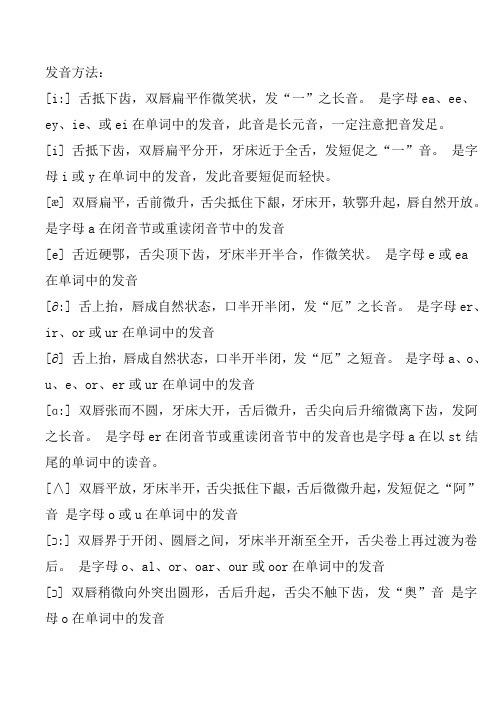
发音方法:[i:] 舌抵下齿,双唇扁平作微笑状,发“一”之长音。
是字母ea、ee、ey、ie、或ei在单词中的发音,此音是长元音,一定注意把音发足。
[i] 舌抵下齿,双唇扁平分开,牙床近于全舌,发短促之“一”音。
是字母i或y在单词中的发音,发此音要短促而轻快。
[æ] 双唇扁平,舌前微升,舌尖抵住下龈,牙床开,软鄂升起,唇自然开放。
是字母a在闭音节或重读闭音节中的发音[e] 舌近硬鄂,舌尖顶下齿,牙床半开半合,作微笑状。
是字母e或ea在单词中的发音[∂:] 舌上抬,唇成自然状态,口半开半闭,发“厄”之长音。
是字母er、ir、or或ur在单词中的发音[∂] 舌上抬,唇成自然状态,口半开半闭,发“厄”之短音。
是字母a、o、u、e、or、er或ur在单词中的发音[ɑ:] 双唇张而不圆,牙床大开,舌后微升,舌尖向后升缩微离下齿,发阿之长音。
是字母er在闭音节或重读闭音节中的发音也是字母a在以st结尾的单词中的读音。
[∧] 双唇平放,牙床半开,舌尖抵住下龈,舌后微微升起,发短促之“阿”音是字母o或u在单词中的发音[כ:] 双唇界于开闭、圆唇之间,牙床半开渐至全开,舌尖卷上再过渡为卷后。
是字母o、al、or、oar、our或oor在单词中的发音[כ] 双唇稍微向外突出圆形,舌后升起,舌尖不触下齿,发“奥”音是字母o在单词中的发音[u:] 双唇成圆形,牙床近于半合,舌尖不触下齿,自然而不用力,发“屋”之长音。
是字母oo或ou在单词中的发音[u] 双唇成圆形,牙床近于半合,舌尖不触下齿,自然而不用力,发短促之“屋”音。
是字母u、oo或ou在单词中的发音[ai] 将口张开略圆,舌后升起,舌尖向后收缩,由发“阿”音平稳过渡到发“一”音。
是字母i或y在单词中的读音[ei] 舌类顶下齿,牙床半开半合,双唇扁平,由发“哀”平稳过渡到发“一”之长音。
是字母a在开音节中的读音。
[au] 将口张开略圆,渐渐合拢,双唇成圆形,由发“阿”音平稳过渡到发“屋”音。
英语正确发音的技巧大全
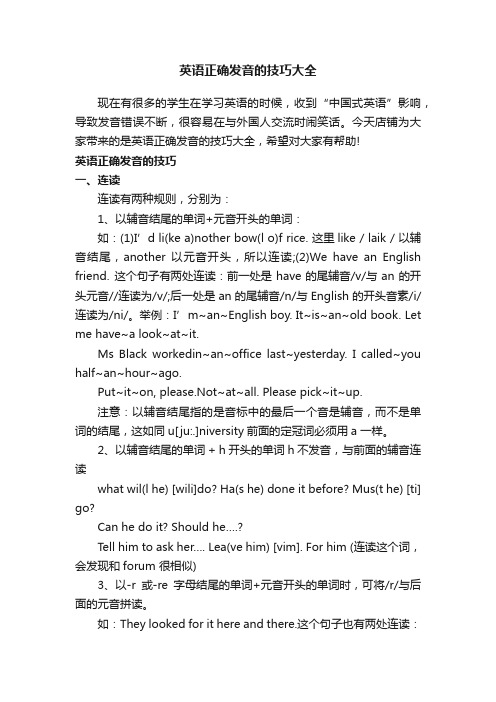
英语正确发音的技巧大全现在有很多的学生在学习英语的时候,收到“中国式英语”影响,导致发音错误不断,很容易在与外国人交流时闹笑话。
今天店铺为大家带来的是英语正确发音的技巧大全,希望对大家有帮助!英语正确发音的技巧一、连读连读有两种规则,分别为:1、以辅音结尾的单词+元音开头的单词:如:(1)I’d li(ke a)nother bow(l o)f rice. 这里like / laik / 以辅音结尾,another 以元音开头,所以连读;(2)We have an English friend. 这个句子有两处连读:前一处是have的尾辅音/v/与an的开头元音//连读为/v/;后一处是an的尾辅音/n/与English的开头音素/i/连读为/ni/。
举例:I’m~an~English boy. It~is~an~old book. Let me have~a look~at~it.Ms Black workedin~an~office last~yesterday. I called~you half~an~hour~ago.Put~it~on, please.Not~at~all. Please pick~it~up.注意:以辅音结尾指的是音标中的最后一个音是辅音,而不是单词的结尾,这如同u[ju:.]niversity前面的定冠词必须用a 一样。
2、以辅音结尾的单词 + h开头的单词h不发音,与前面的辅音连读what wil(l he) [wili]do? Ha(s he) done it before? Mus(t he) [ti] go?Can he do it? Should he….?Tell him to ask her…. Lea(ve him) [vim]. For him (连读这个词,会发现和forum 很相似)3、以-r或-re字母结尾的单词+元音开头的单词时,可将/r/与后面的元音拼读。
英语正确发音的十个方法

正确发音的十个方法学习英语如果没有一个正确的英语发音,那就会被认为是中国式英语。
要摆脱浓烈的汉语腔练习一口标准的英语发音,有哪些方法呢?教你十招。
1.观察你的外籍老师说话时的口型,然后学着模仿他们。
或者当你看英文节目的时候,观察native speaker说话的嘴型,并重复他们所说的话,模仿的时候要特别注意他们的语调以及节奏变化。
2.放慢说话的语速如果说得太快了,而且还带有一些不准确的发音和音调,其他人会很难明白你想表达什么意思。
学着放慢你的语速-不用担心听你说话的人会不耐烦,没有什么比能让人听懂你在说什么更重要的了,你说是吗?3.多听听英文歌最好能做到听懂会唱。
找几首简单的英文歌,歌词要易懂好学,尽量明白每个单词的意思,唱得时候发音准确,有集体活动的时候还能跟同学SHOW一下呢,听歌学习两不误!4.学着使用英文词典试着让自己熟悉词典里面单词的音标,找出那些对你来说很难说出口的词的正确发音。
5.把口语中的常用词列一个清单,对于那些你觉得特别难发音的词,找朋友或外教示范发音给你听记下这些的发音之后,然后练习,自己读的同时也回想一下老师的读法:我是不是也说得一样呢?6.买一些带有听力DISC的英文书选择一些文章的选段,大声朗读并录下来,然后再比较光盘里面的读音,你就能找出自己哪里的发音不准确了。
7.着重练习单词的尾音特别注意以“S”和“ED”结尾的单词,长期练习会加强嘴部肌肉的锻炼。
8.每天大声朗读15-20分钟有关研究指出:当学习一门新的语言的时候,3个月的不间断的发声练习能锻炼你的嘴部肌肉,将会更有利于发音的准确性。
9.录下自己声音,听听看自己的错误发音很多人不喜欢听到自己的声音,但是这确实是一项很重要的练习。
这样当你到了经常会出错的地方,大脑就会有意识地提醒自己:不要再犯相同的错误了。
10.嘿,耐心点!谁都希望第二天马上就能说一口流利的英文,你想试着改变你说话的方式,但是通常第二天一早起来又忘了,一旦预期的结果没达到马上就放弃了。
英语学习中的常见发音问题及纠正方法
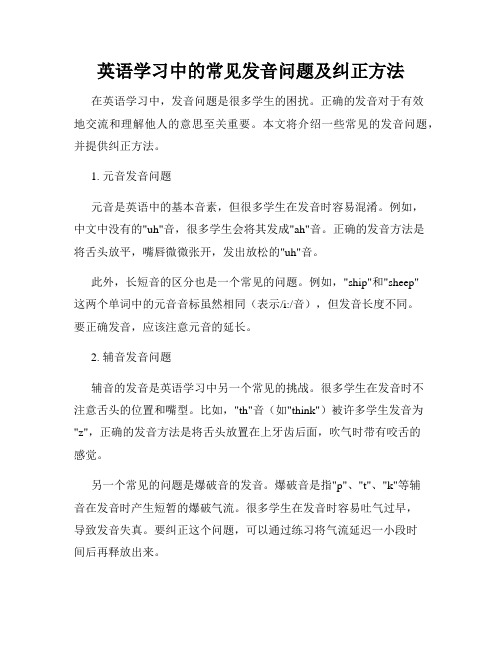
英语学习中的常见发音问题及纠正方法在英语学习中,发音问题是很多学生的困扰。
正确的发音对于有效地交流和理解他人的意思至关重要。
本文将介绍一些常见的发音问题,并提供纠正方法。
1. 元音发音问题元音是英语中的基本音素,但很多学生在发音时容易混淆。
例如,中文中没有的"uh"音,很多学生会将其发成"ah"音。
正确的发音方法是将舌头放平,嘴唇微微张开,发出放松的"uh"音。
此外,长短音的区分也是一个常见的问题。
例如,"ship"和"sheep"这两个单词中的元音音标虽然相同(表示/i:/音),但发音长度不同。
要正确发音,应该注意元音的延长。
2. 辅音发音问题辅音的发音是英语学习中另一个常见的挑战。
很多学生在发音时不注意舌头的位置和嘴型。
比如,"th"音(如"think")被许多学生发音为"z",正确的发音方法是将舌头放置在上牙齿后面,吹气时带有咬舌的感觉。
另一个常见的问题是爆破音的发音。
爆破音是指"p"、"t"、"k"等辅音在发音时产生短暂的爆破气流。
很多学生在发音时容易吐气过早,导致发音失真。
要纠正这个问题,可以通过练习将气流延迟一小段时间后再释放出来。
3. 重读音节发音问题英语中的重读音节非常重要,因为它们决定了单词的发音和意义。
然而,很多学生在发音时不知道哪个音节应该重读,导致单词的发音不准确。
一种解决方法是通过听力训练来熟悉英语中的重读模式。
可以多听一些英语新闻、电影和音乐来提高对重读音节的敏感度。
同时,使用词典查询单词时也可以查看音标和重读标记,以便更准确地发音。
4. 连读和弱读问题连读和弱读是英语中的语音现象,很多学生在听力和口语表达时容易忽视。
不同单词之间的边界模糊,导致发音不连贯。
美式英语口语的发音技巧(最新)
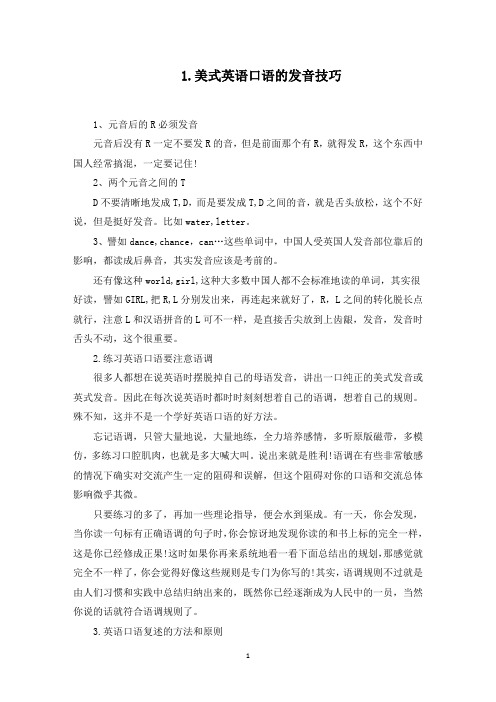
1.美式英语口语的发音技巧1、元音后的R必须发音元音后没有R一定不要发R的音,但是前面那个有R,就得发R,这个东西中国人经常搞混,一定要记住!2、两个元音之间的TD不要清晰地发成T,D,而是要发成T,D之间的音,就是舌头放松,这个不好说,但是挺好发音。
比如water,letter。
3、譬如dance,chance,can…这些单词中,中国人受英国人发音部位靠后的影响,都读成后鼻音,其实发音应该是考前的。
还有像这种world,girl,这种大多数中国人都不会标准地读的单词,其实很好读,譬如GIRL,把R,L分别发出来,再连起来就好了,R,L之间的转化脱长点就行,注意L和汉语拼音的L可不一样,是直接舌尖放到上齿龈,发音,发音时舌头不动,这个很重要。
2.练习英语口语要注意语调很多人都想在说英语时摆脱掉自己的母语发音,讲出一口纯正的美式发音或英式发音。
因此在每次说英语时都时时刻刻想着自己的语调,想着自己的规则。
殊不知,这并不是一个学好英语口语的好方法。
忘记语调,只管大量地说,大量地练,全力培养感情,多听原版磁带,多模仿,多练习口腔肌肉,也就是多大喊大叫。
说出来就是胜利!语调在有些非常敏感的情况下确实对交流产生一定的阻碍和误解,但这个阻碍对你的口语和交流总体影响微乎其微。
只要练习的多了,再加一些理论指导,便会水到渠成。
有一天,你会发现,当你读一句标有正确语调的句子时,你会惊讶地发现你读的和书上标的完全一样,这是你已经修成正果!这时如果你再来系统地看一看下面总结出的规划,那感觉就完全不一样了,你会觉得好像这些规则是专门为你写的!其实,语调规则不过就是由人们习惯和实践中总结归纳出来的,既然你已经逐渐成为人民中的一员,当然你说的话就符合语调规则了。
3.英语口语复述的方法和原则学英语离不开记忆,记忆不是死记硬背,要有灵活性。
复述就是一种很好的自我训练口语,记忆单词、的句子的形式。
复述有两种常见的方法。
一是阅读后复述,一是听磁带后复述。
英语七大不发音规则口诀

英语七大不发音规则口诀
英语中的七大不发音规则可以通过以下口诀来记忆,这有助于理解和应用这些规则:
1.知识的“K”:当“k”位于词首且后面紧跟“n”
时,如“knee”, “knife”, “know”,“k”不
发音。
2.骑士的“GH”:在某些词中,“gh”不发音,如
“night”, “thought”, “high”,尤其在词尾
或词中。
3.魂魄的“G”:当“g”位于“gn”组合中,如
“gnome”, “sign”,“g”不发音。
4.世界的“W”:当“w”位于“wr”组合中,如
“write”, “wrong”,“w”不发音。
5.心的“H”:在某些词中,“h”是不发音的,如
“honest”, “hour”。
6.飞行的“L”:在某些词尾的“l”不发音,如
“would”, “should”, “calm”,特别是在英式
英语中更为明显。
7.蛇的“S”:在“isle”和“aisle”这类词中,
“s”不发音。
记住这些规则可以帮助提高英语发音的准确性,特别是在学习阶段。
然而,英语是一种充满例外的语言,所以这些规则并不总是适用于所有情况。
实践和听力练习是提高发音技能的关键。
十个难学的音标读法

十个难学的音标读法音标是学习英语发音的基础,但有些音标的读法却让人头痛不已。
下面将介绍十个难学的音标读法,并提供一些技巧帮助你克服这些难点。
1. /ð/音:这个音标的读法是“th”,例如“this”、“that”。
但很多学生容易将其读作/f/音。
要正确发音,可以用舌头轻触上齿龈,同时发出轻声/v/音。
2. /ə/音:这个音标的读法是“uh”,例如“about”、“above”。
但很多学生容易将其读作/ʌ/音。
要正确发音,可以将嘴巴稍微张开,舌头放松,发出中性的短音。
3. /ʊ/音:这个音标的读法是“oo”,例如“book”、“good”。
但很多学生容易将其读作/u/音。
要正确发音,可以将嘴巴稍微张开,嘴唇微微收紧,舌头放松,发出轻声的/ʊ/音。
4. /θ/音:这个音标的读法是“th”,例如“think”、“thank”。
但很多学生容易将其读作/s/音。
要正确发音,可以用舌尖轻触上齿龈,同时发出轻声的/θ/音。
5. /ɔɪ/音:这个音标的读法是“oi”,例如“boy”、“toy”。
但很多学生容易将其读作/ɔi/音。
要正确发音,可以将嘴巴稍微张开,嘴唇微微收紧,舌头放松,发出轻声的/ɔɪ/音。
6. /æ/音:这个音标的读法是“a”,例如“cat”、“bat”。
但很多学生容易将其读作/æ/音。
要正确发音,可以将嘴巴稍微张开,舌头放松,发出轻声的/æ/音。
7. /ʃ/音:这个音标的读法是“sh”,例如“she”、“ship”。
但很多学生容易将其读作/s/音。
要正确发音,可以将舌头卷起,用舌尖轻触上齿龈,同时发出轻声的/ʃ/音。
8. /ʒ/音:这个音标的读法是“zh”,例如“treasure”、“measure”。
但很多学生容易将其读作/dʒ/音。
要正确发音,可以将舌头卷起,用舌尖轻触上齿龈,同时发出轻声的/ʒ/音。
9. /ŋ/音:这个音标的读法是“ng”,例如“song”、“long”。
发音易错的10个常见英语单词

发音易错的10个常见英语单词1. Usually [ju:ʒuəli]这是比较难纠正的一个发音。
通常将这个词读做[ˈju:ruəli]。
/ʒ/的发音是个难点。
同类错误包括:treasure, pleasure2. Thing [θiŋ]这个词经常被读为[siŋ] [sin]。
/θ/的发音是难点,经常被读为/s/。
同类错误包括:theatre, Thursday, theory, theme,throat, thread, think, thank, thirteen, thirty, third, thousand, thick,thirsty, thoughtful, thorough3. Then [ðen]这个词经常被读成[zen] [den] [zən] 。
/ð/的发音是难点,经常被读为/z/。
同类错误包括:they, them, their, theirs, there,the, than, then, though, thus, therefore4. The [ðə]这个词经常被读为[zə] [də] [dʒə]. 这是Chin-glish的代表发音。
这个词还经常被错误加入卷舌音,读为ther。
5. China [tʃainə]这个词经常被错误的加入卷舌音,读为Chiner。
同类错误包括:Christmas, delicious, idea6. Kind [kaind]这个词经常被读做[kænd] (canned). 有趣的是几次都有学生说到He is a canned (kind) person. 从“他是一个好人变成了”“他是一个罐装人”。
同类错误包括:like, style, mind, quiet, retire7. Fun [fʌn]这个词经常被错误的读成[fʌŋ] (类似中文的“放”)。
鼻音的错误非常常见,涉及到/n/ 和/ŋ/的音学生经常出错。
重音容易读错的英文单词
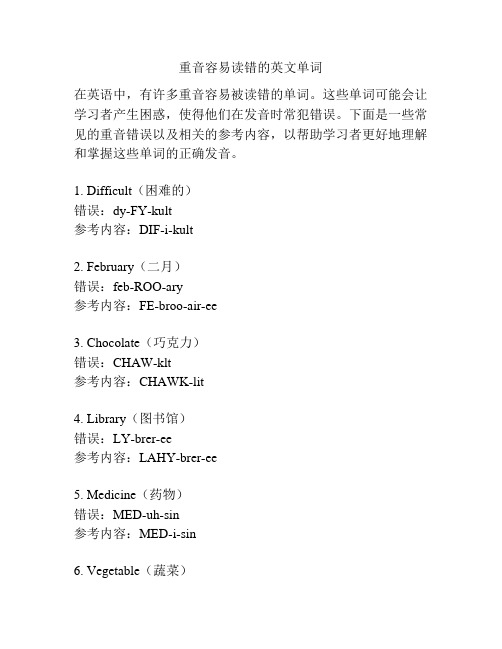
重音容易读错的英文单词在英语中,有许多重音容易被读错的单词。
这些单词可能会让学习者产生困惑,使得他们在发音时常犯错误。
下面是一些常见的重音错误以及相关的参考内容,以帮助学习者更好地理解和掌握这些单词的正确发音。
1. Difficult(困难的)错误:dy-FY-kult参考内容:DIF-i-kult2. February(二月)错误:feb-ROO-ary参考内容:FE-broo-air-ee3. Chocolate(巧克力)错误:CHAW-klt参考内容:CHAWK-lit4. Library(图书馆)错误:LY-brer-ee参考内容:LAHY-brer-ee5. Medicine(药物)错误:MED-uh-sin参考内容:MED-i-sin6. Vegetable(蔬菜)参考内容:VEJ-tuh-buhl7. Mischievous(淘气的)错误:miz-CHEE-vee-us参考内容:MIS-chuh-vuhs8. Schedule(时间表)错误:SKEJ-ool参考内容:SKEH-jool9. Comfortable(舒适的)错误:CUM-fer-tuh-buhl参考内容:KUHM-fert-uh-buhl10. Photography(摄影)错误:foh-TOG-ruh-fee参考内容:fuh-TOG-ruh-fee11. Restaurant(餐厅)错误:RES-tuh-rant参考内容:RES-tuh-rawnt12. Wednesday(星期三)错误:WENZ-day参考内容:WENZ-dey13. Tomato(番茄)参考内容:tuh-MAH-toh14. Et cetera(等等)错误:ex-SET-ruh参考内容:et SET-uh-ruh15. Refrigerator(冰箱)错误:ree-FRIDG-uh-ray-ter 参考内容:ri-FRIJ-uh-ray-ter16. Australia(澳大利亚)错误:o-STRAIL-ya参考内容:uh-STREY-lee-uh17. Elephant(大象)错误:EE-luh-fent参考内容:EL-uh-fent18. Laboratory(实验室)错误:lab-ROH-ra-tory参考内容:luh-BORE-uh-tory19. History(历史)错误:HISS-tore-ee参考内容:HISS-tree20. Female(女性)错误:FEE-male参考内容:FEE-mayl这些例子涵盖了一些常见的重音错误。
100个最难的英语单词发音练习
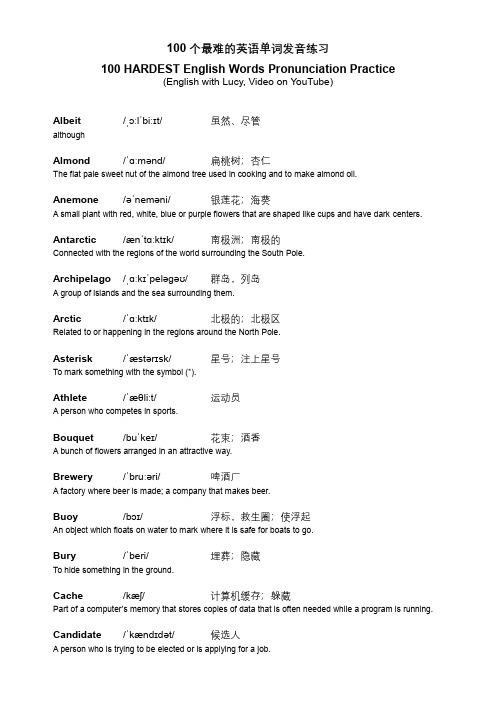
100个最难的英语单词发音练习100 HARDEST English Words Pronunciation Practice(English with Lucy, Video on YouTube)Albeit/ˌɔːlˈbiːɪt/虽然、尽管althoughAlmond/ˈɑːmənd/扁桃树;杏仁The flat pale sweet nut of the almond tree used in cooking and to make almond oil.Anemone/əˈneməni/银莲花;海葵A small plant with red, white, blue or purple flowers that are shaped like cups and have dark centers.Antarctic/ænˈtɑːktɪk/南极洲;南极的Connected with the regions of the world surrounding the South Pole.Archipelago/ˌɑːkɪˈpeləɡəʊ/群岛,列岛A group of islands and the sea surrounding them.Arctic/ˈɑːktɪk/北极的;北极区Related to or happening in the regions around the North Pole.Asterisk/ˈæstərɪsk/星号;注上星号To mark something with the symbol (*).Athlete/ˈæθliːt/运动员A person who competes in sports.Bouquet/buˈkeɪ/花束;酒香A bunch of flowers arranged in an attractive way.Brewery/ˈbruːəri/啤酒厂A factory where beer is made; a company that makes beer.Buoy/bɔɪ/浮标,救生圈;使浮起An object which floats on water to mark where it is safe for boats to go.Bury/ˈberi/埋葬;隐藏To hide something in the ground.Cache/kæʃ/计算机缓存;躲藏Part of a computer’s memory that stores copies of data that is often needed while a program is running.Candidate/ˈkændɪdət/候选人A person who is trying to be elected or is applying for a job.Caramel/ˈkærəmel/焦糖Burnt sugar used for adding color and flavor to food.Chaos/ˈkeɪɒs/混沌,混乱A state of complete confusion and lack of order.Chauvinism/ˈʃəʊvɪnɪzəm/沙文主义;大男子主义An aggressive and unreasonable belief that your own country is better than all others.Clothes/kləʊðz/衣服The things that you wear, such as trousers, shirts and shorts.Cocoa/ˈkəʊkəʊ/可可豆;可可饮料Dark brown powder made from the crushed seeds (called cocoa beans) of a tropical tree.Comfortable/ˈkʌmftəbl/舒适的Feeling relaxed in a pleasant way.Coup/kuː/政变;使…颠倒A sudden change of government that is illegal and often violent.Debris/ˈdebriː/碎片,残骸Pieces of material that are left somewhere and are not wanted.Debut/ˈdeɪbjuː/初次登台;开张The first public appearance of a performer or sports player.Decrepit/dɪˈkrepɪt/衰老的;破旧的Very old and not in good condition or health.Defibrillator/diːˈfɪbrɪleɪtə(r)/除颤器A piece of equipment used to control the movements of the heart muscles by giving the heart a controlled electric shock.Dengue/ˈdeŋɡi/登革热A disease caused by a virus carried by mosquitoes.Deteriorate/dɪˈtɪəriəreɪt/恶化;变坏To become worse.Dilate/daɪˈleɪt/扩大,膨胀;使扩大,使膨胀To become or to make something larger, wider or more open.Elite/eɪˈliːt/精英;精华(of a group of people in a society) small in number but powerful and with a lot of influence, because they are rich, intelligent, etc.Epitome/ɪˈpɪtəmi/缩影;摘要A perfect example of something.Espresso/eˈspresəʊ/浓咖啡A strong black coffee made by forcing steam or boiling water through ground coffee beans.Et cetera/ˌet ˈsetərə/等等Used after a list to show that there are other things that you could have mentioned.Faux pas/'fəu'pɑ:/失礼,失态An action or remark that causes embarrassment because it is not socially correct.February/ˈfebruəri/二月The 2nd month of the year, between January and March.Film/fɪlm/电影;胶卷A series of moving pictures.Fiscal/ˈfɪskl/财政的,会计的Connected with government or public money, especially taxes.Foliage/ˈfəʊliɪdʒ/植物;叶子(总称)A leaf of a tree or a plant.Foyer/ˈfɔɪeɪ/门厅,休息室;大厅A large open space inside the entrance of a theatre or hotel where people can meet or wait.Genre/ˈʒɒrə/类别;流派;风俗画A particular type or style of film, art, music or literature that you can recognize because of its special features.Gif/ɡɪf/可交换的图像文件The abbreviation for ‘Graphic Interchange Format’.Gauge/ɡeɪdʒ/计量器;测量An instrument for measuring the amount or level of something.Heinous/ˈheɪnəs/可憎的;极凶恶的Morally, very bad.Heir/eə(r)/继承人;后嗣A person who has the legal right to receive someone’s money, property or title when that person dies.Herb/hɜːb/香草,药草A plant whose leaves, flowers or seeds are used to flavor food, in medicines or for their pleasant smell. Hierarchy/ˈhaɪərɑːki/层级;等级制度A system, especially in a society or an organization, in which people are organized into different levels of importance from highest to lowest.Hyperbole/haɪˈpɜːbəli/夸张的语句;夸张法A way of writing or speaking that makes something sound better, more exciting, more dangerous, etc. than it really is.Infamous/ˈɪnfəməs/名声狼藉的;无耻的Well known for being bad or evil.Ingenuity/ˌɪndʒəˈnuːəti/心灵手巧;精巧The ability to invent things or solve problems in clever new way.Interpret/ɪnˈtɜːprət/口译;解释To explain the meaning of something.Itinerary/aɪˈtɪnərəri/旅程;巡回的A plan of a journey, including the rout and the places that you visit.Jewelry/'dʒuːəlrɪ/珠宝Objects such as rings and necklaces that people wear as decoration.Liable/ˈlaɪəbl/有责任的,有义务的Legally responsible for paying the cost.Library/ˈlaɪbrəri/图书馆;文库A building in which books, CDs, newspapers, etc. are kept for people to read, study or borrow.Lingerie/ˈlænʒəri/女用贴身内衣裤Women’s underwear.Mauve/məʊv/淡紫色A pale purple color.Medieval/ˌmediˈiːvl/中世纪的;原始的Connected with the middle age.Meme/miːm/大脑模仿病毒;文化基因An image, video, etc. that is quickly passed from one internet user to another, often with slight changes that make it humorous.Miniature/ˈmɪnətʃə(r)/微型的,小规模的;缩图;微型图Very small; much smaller than usual.Mischievous/ˈmɪstʃɪvəs/淘气的;恶作剧的Enjoying playing tricks or annoying people.Monk/mʌŋk/僧侣;和尚A member of a religious group of men who live apart from each other in a monastery.Moot/muːt/无实际意义的;提出…供讨论;辩论会Unlikely to happen and therefore not worth considering.Niche/niːʃ/壁;合适的职业A comfortable or suitable job, role, way of life, etc.Nuclear/ˈnjuːkliə(r)/原子能的;细胞核的Using, producing or resulting from nuclear energy.Onomatopoeia/ˌɒnəˌmætəˈpiːə/拟声;声喻法The fact of words containing sounds similar to the noise they describe.Ordinance/ˈɔːdɪnəns/条例;法令An order or a rule made by a government or a person in a position of authority.Paradigm/ˈpærədaɪm/范例;词形变化表A typical example or pattern of something.Phenomenon/fəˈnɒmɪnən/现象;奇迹A fact or an event in nature or society, especially one that is not fully undersood.Picture/ˈpɪktʃə(r)/照片A painting or drawing, ect. That shows a scene, a person or thing.Pizza/ˈpiːtsə/比萨饼An Italian dish consisting of a round flat bread base with cheese, tomatoes, vegetables, meat, etc. on top.Plumber/ˈplʌmə(r)/水管工A person whose job is to fix and repair things such as toilets and water pipes.Prelude/ˈpreljuːd/前奏;序幕A short piece of music, especially an introduction to a longer piece.Prerogative/prɪˈrɒɡətɪv/特权;有特权的A right or advantage belonging to a particular person or group because of their importance or social position.Prescription/prɪˈskrɪpʃn/药方;惯例An official piece of paper on which a doctor writes which type of medicine you should have, and which enables you to get it from a chemist/drugstore.Probably/ˈprɒbəbli/大概;或许Used to say that something is likely to happen or to be true.Pronunciation/prəˌnʌnsiˈeɪʃn/发音;读法The way in which a language or a particular word or sound is pronounced.Prostrate/ˈprɒstreɪt/俯卧的;使…屈服Lying on the ground and facing downwards.Pseudonym/ˈsuːdənɪm/笔名;假名A name used by somebody, especially a writer, instead of their real name.Quay/kiː/码头A platform in a harbor where boats come in to load.Queue/kjuː/队列A line of people, cars, etc. waiting for something or to do something.Quinoa/ˈkiːnwɑː/藜麦A south American plant, grown for its seedsRaspberry/ˈrɑːzbəri/树莓A small dark red soft fruit grown on bushes.Regime/reɪˈʒiːm/政权;社会制度A method or system of managing or organizing something.Rendezvous/ˈrɒndeɪvuː/约会;会合An arrangement to meet someone at a particular place and time.Rural/ˈrʊrəl/农村的;乡下的Connected with or like the countryside.Salmon/ˈsæmən/鲑鱼A large fish with silver skin and pink flesh that is used for food.Schedule/ˈʃedjuːl/时间表A plan that lists all work that you need to do and when you need to do each thing.Silicon/ˈsɪlɪkən/硅A chemical element which exists as brown powder or a grey solid that is found in rocks and sand.Sixth/sɪksθ/第六Ordinal number 6.Specific/spəˈsɪfɪk/特殊的Detailed and exact.Specifiable/ˈspesɪfaɪəbl/可指明的;可列举的Something that can be stated, especially by giving an exact measurement, time, date, weight, etc.Status/ˈsteɪtəs/地位;状态The situation at a particular time during a process.Subtle/ˈsʌtl/微妙的;精细的Not very noticeable or obvious.Suite/swiːt/(一套)家具;套房A set of rooms, especially in a hotel.Temperature/ˈtemprətʃə(r)/温度The measurement in degrees of how cold or hot a place or thing is.Ticklish/ˈtɪklɪʃ/不安定的;难对付的Sensitive to being tickled.Triathlon/traɪˈæθlən/三项全能运动A sporting event in which people compete in three different sports, usually swimming, cycling and running.Valet/ˈvælɪt/贴身男仆A man who is employed for cleaning, pressing, laundering, etc. for patrons of a hotel.Vehicle/ˈviːəkl/车辆;交通工具A thing that is used for transporting people or goods from one place to another, such as a car or lorry.Wintry/ˈwɪntri/寒冷的;冷淡的Typical of winter; cold.Yolk/jəʊk/蛋黄The round yellow part in the middle of an egg.。
单词发音规则与技巧

单词发音规则与技巧
英语单词发音规则与技巧如下:
1.连读:在同一个意群里,相邻的两个词,前者以辅音结尾,后者以元音开头,就可
以连读。
如:put~it~on。
2.辅音+元音:一句话中相邻的两个单词,前一个单词以辅音结尾,后一个单词以元音
开始,拼读成“辅音+元音”。
例如:take~it~easy。
3.长元音的发音规则:将舌前部向硬腭尽量抬起,舌的两侧抵住上牙的两侧,舌头肌
肉保持紧张,嘴唇向两边伸开,成扁平形,与微笑时的口型相似。
比短元音/i/发音要长。
比/ə/发音时间要长。
4.短元音的发音规则:舌尖抵下齿,舌前部稍抬起,唇型平,开口度最小。
发音比/ə/
稍短些。
学习发音规则之后,可以通过模仿和实践来提高发音的准确性和流利度。
建议多听、多说、多练习。
难读的英语单词

难读的英语单词
英语单词中有很多难读的单词,即使是母语为英语的人也会有困难。
以下是一些常见的难读单词:
1. Worcestershire - 这个单词是指一种调味酱,发音为“wus-tuh-sher”。
2. Colonel - 这个单词是指一个军衔,发音为“kern-uhl”。
3. Entrepreneur - 这个单词是指一个创业家,发音为
“ahn-truh-pruh-nur”。
4. Anemone - 这个单词是指一种花,发音为“uh-nem-uh-nee”。
5. Quinoa - 这个单词是指一种谷物,发音为“keen-wah”。
6. Synecdoche - 这个单词是指一种修辞手法,发音为
“si-nek-doh-kee”。
7. Chiaroscurist - 这个单词是指一名油画家,发音为
“kee-ar-uh-skyoor-ist”。
8. Phlegm - 这个单词是指痰,发音为“flem”。
以上是一些常见的难读单词,掌握这些单词的发音可以帮助我们更好地理解和运用英语。
- 1 -。
难发音的英语单词
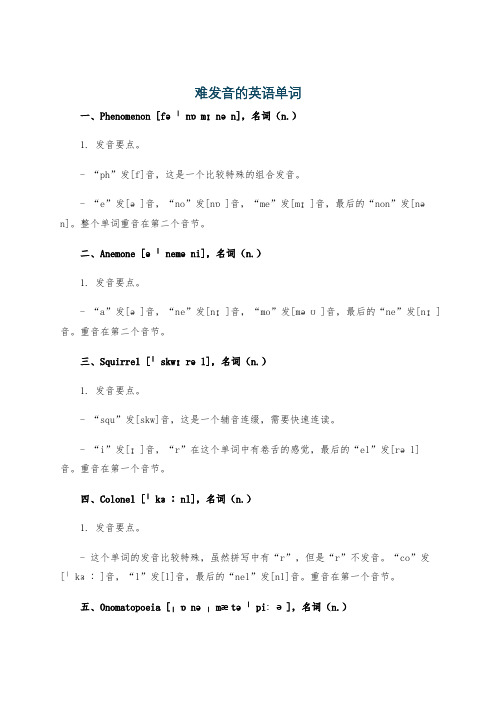
难发音的英语单词
一、Phenomenon [fəˈnɒmɪnən],名词(n.)
1. 发音要点。
- “ph”发[f]音,这是一个比较特殊的组合发音。
- “e”发[ə]音,“no”发[nɒ]音,“me”发[mɪ]音,最后的“non”发[nən]。
整个单词重音在第二个音节。
二、Anemone [əˈneməni],名词(n.)
1. 发音要点。
- “a”发[ə]音,“ne”发[nɪ]音,“mo”发[məʊ]音,最后的“ne”发[nɪ]音。
重音在第二个音节。
三、Squirrel [ˈskwɪrəl],名词(n.)
1. 发音要点。
- “squ”发[skw]音,这是一个辅音连缀,需要快速连读。
- “i”发[ɪ]音,“r”在这个单词中有卷舌的感觉,最后的“el”发[rəl]音。
重音在第一个音节。
四、Colonel [ˈkɜːnl],名词(n.)
1. 发音要点。
- 这个单词的发音比较特殊,虽然拼写中有“r”,但是“r”不发音。
“co”发[ˈkɜː]音,“l”发[l]音,最后的“nel”发[nl]音。
重音在第一个音节。
五、Onomatopoeia [ˌɒnəˌmætəˈpiːə],名词(n.)
1. 发音要点。
- “o”发[ɒ]音,“no”发[nə]音,“ma”发[mæ]音,“to”发[tə]音,“poe”发[ˈpiː]音,最后的“ia”发[ə]音。
重音在第四个音节。
100个最难的英语单词发音练习

100个最难的英语单词发音练习100 HARDEST English Words Pronunciation Practice(English with Lucy, Video on YouTube)Albeit/ˌɔːlˈbiːɪt/虽然、尽管althoughAlmond/ˈɑːmənd/扁桃树;杏仁The flat pale sweet nut of the almond tree used in cooking and to make almond oil.Anemone/əˈneməni/银莲花;海葵A small plant with red, white, blue or purple flowers that are shaped like cups and have dark centers.Antarctic/ænˈtɑːktɪk/南极洲;南极的Connected with the regions of the world surrounding the South Pole.Archipelago/ˌɑːkɪˈpeləɡəʊ/群岛,列岛A group of islands and the sea surrounding them.Arctic/ˈɑːktɪk/北极的;北极区Related to or happening in the regions around the North Pole.Asterisk/ˈæstərɪsk/星号;注上星号To mark something with the symbol (*).Athlete/ˈæθliːt/运动员A person who competes in sports.Bouquet/buˈkeɪ/花束;酒香A bunch of flowers arranged in an attractive way.Brewery/ˈbruːəri/啤酒厂A factory where beer is made; a company that makes beer.Buoy/bɔɪ/浮标,救生圈;使浮起An object which floats on water to mark where it is safe for boats to go.Bury/ˈberi/埋葬;隐藏To hide something in the ground.Cache/kæʃ/计算机缓存;躲藏Part of a computer’s memory that stores copies of data that is often needed while a program is running.Candidate/ˈkændɪdət/候选人A person who is trying to be elected or is applying for a job.Caramel/ˈkærəmel/焦糖Burnt sugar used for adding color and flavor to food.Chaos/ˈkeɪɒs/混沌,混乱A state of complete confusion and lack of order.Chauvinism/ˈʃəʊvɪnɪzəm/沙文主义;大男子主义An aggressive and unreasonable belief that your own country is better than all others.Clothes/kləʊðz/衣服The things that you wear, such as trousers, shirts and shorts.Cocoa/ˈkəʊkəʊ/可可豆;可可饮料Dark brown powder made from the crushed seeds (called cocoa beans) of a tropical tree.Comfortable/ˈkʌmftəbl/舒适的Feeling relaxed in a pleasant way.Coup/kuː/政变;使…颠倒A sudden change of government that is illegal and often violent.Debris/ˈdebriː/碎片,残骸Pieces of material that are left somewhere and are not wanted.Debut/ˈdeɪbjuː/初次登台;开张The first public appearance of a performer or sports player.Decrepit/dɪˈkrepɪt/衰老的;破旧的Very old and not in good condition or health.Defibrillator/diːˈfɪbrɪleɪtə(r)/除颤器A piece of equipment used to control the movements of the heart muscles by giving the heart a controlled electric shock.Dengue/ˈdeŋɡi/登革热A disease caused by a virus carried by mosquitoes.Deteriorate/dɪˈtɪəriəreɪt/恶化;变坏To become worse.Dilate/daɪˈleɪt/扩大,膨胀;使扩大,使膨胀To become or to make something larger, wider or more open.Elite/eɪˈliːt/精英;精华(of a group of people in a society) small in number but powerful and with a lot of influence, because they are rich, intelligent, etc.Epitome/ɪˈpɪtəmi/缩影;摘要A perfect example of something.Espresso/eˈspresəʊ/浓咖啡A strong black coffee made by forcing steam or boiling water through ground coffee beans.Et cetera/ˌet ˈsetərə/等等Used after a list to show that there are other things that you could have mentioned.Faux pas/'fəu'pɑ:/失礼,失态An action or remark that causes embarrassment because it is not socially correct.February/ˈfebruəri/二月The 2nd month of the year, between January and March.Film/fɪlm/电影;胶卷A series of moving pictures.Fiscal/ˈfɪskl/财政的,会计的Connected with government or public money, especially taxes.Foliage/ˈfəʊliɪdʒ/植物;叶子(总称)A leaf of a tree or a plant.Foyer/ˈfɔɪeɪ/门厅,休息室;大厅A large open space inside the entrance of a theatre or hotel where people can meet or wait.Genre/ˈʒɒrə/类别;流派;风俗画A particular type or style of film, art, music or literature that you can recognize because of its special features.Gif/ɡɪf/可交换的图像文件The abbreviation for ‘Graphic Interchange Format’.Gauge/ɡeɪdʒ/计量器;测量An instrument for measuring the amount or level of something.Heinous/ˈheɪnəs/可憎的;极凶恶的Morally, very bad.Heir/eə(r)/继承人;后嗣A person who has the legal right to receive someone’s money, property or title when that person dies.Herb/hɜːb/香草,药草A plant whose leaves, flowers or seeds are used to flavor food, in medicines or for their pleasant smell. Hierarchy/ˈhaɪərɑːki/层级;等级制度A system, especially in a society or an organization, in which people are organized into different levels of importance from highest to lowest.Hyperbole/haɪˈpɜːbəli/夸张的语句;夸张法A way of writing or speaking that makes something sound better, more exciting, more dangerous, etc. than it really is.Infamous/ˈɪnfəməs/名声狼藉的;无耻的Well known for being bad or evil.Ingenuity/ˌɪndʒəˈnuːəti/心灵手巧;精巧The ability to invent things or solve problems in clever new way.Interpret/ɪnˈtɜːprət/口译;解释To explain the meaning of something.Itinerary/aɪˈtɪnərəri/旅程;巡回的A plan of a journey, including the rout and the places that you visit.Jewelry/'dʒuːəlrɪ/珠宝Objects such as rings and necklaces that people wear as decoration.Liable/ˈlaɪəbl/有责任的,有义务的Legally responsible for paying the cost.Library/ˈlaɪbrəri/图书馆;文库A building in which books, CDs, newspapers, etc. are kept for people to read, study or borrow.Lingerie/ˈlænʒəri/女用贴身内衣裤Women’s underwear.Mauve/məʊv/淡紫色A pale purple color.Medieval/ˌmediˈiːvl/中世纪的;原始的Connected with the middle age.Meme/miːm/大脑模仿病毒;文化基因An image, video, etc. that is quickly passed from one internet user to another, often with slight changes that make it humorous.Miniature/ˈmɪnətʃə(r)/微型的,小规模的;缩图;微型图Very small; much smaller than usual.Mischievous/ˈmɪstʃɪvəs/淘气的;恶作剧的Enjoying playing tricks or annoying people.Monk/mʌŋk/僧侣;和尚A member of a religious group of men who live apart from each other in a monastery.Moot/muːt/无实际意义的;提出…供讨论;辩论会Unlikely to happen and therefore not worth considering.Niche/niːʃ/壁;合适的职业A comfortable or suitable job, role, way of life, etc.Nuclear/ˈnjuːkliə(r)/原子能的;细胞核的Using, producing or resulting from nuclear energy.Onomatopoeia/ˌɒnəˌmætəˈpiːə/拟声;声喻法The fact of words containing sounds similar to the noise they describe.Ordinance/ˈɔːdɪnəns/条例;法令An order or a rule made by a government or a person in a position of authority.Paradigm/ˈpærədaɪm/范例;词形变化表A typical example or pattern of something.Phenomenon/fəˈnɒmɪnən/现象;奇迹A fact or an event in nature or society, especially one that is not fully undersood.Picture/ˈpɪktʃə(r)/照片A painting or drawing, ect. That shows a scene, a person or thing.Pizza/ˈpiːtsə/比萨饼An Italian dish consisting of a round flat bread base with cheese, tomatoes, vegetables, meat, etc. on top.Plumber/ˈplʌmə(r)/水管工A person whose job is to fix and repair things such as toilets and water pipes.Prelude/ˈpreljuːd/前奏;序幕A short piece of music, especially an introduction to a longer piece.Prerogative/prɪˈrɒɡətɪv/特权;有特权的A right or advantage belonging to a particular person or group because of their importance or social position.Prescription/prɪˈskrɪpʃn/药方;惯例An official piece of paper on which a doctor writes which type of medicine you should have, and which enables you to get it from a chemist/drugstore.Probably/ˈprɒbəbli/大概;或许Used to say that something is likely to happen or to be true.Pronunciation/prəˌnʌnsiˈeɪʃn/发音;读法The way in which a language or a particular word or sound is pronounced.Prostrate/ˈprɒstreɪt/俯卧的;使…屈服Lying on the ground and facing downwards.Pseudonym/ˈsuːdənɪm/笔名;假名A name used by somebody, especially a writer, instead of their real name.Quay/kiː/码头A platform in a harbor where boats come in to load.Queue/kjuː/队列A line of people, cars, etc. waiting for something or to do something.Quinoa/ˈkiːnwɑː/藜麦A south American plant, grown for its seedsRaspberry/ˈrɑːzbəri/树莓A small dark red soft fruit grown on bushes.Regime/reɪˈʒiːm/政权;社会制度A method or system of managing or organizing something.Rendezvous/ˈrɒndeɪvuː/约会;会合An arrangement to meet someone at a particular place and time.Rural/ˈrʊrəl/农村的;乡下的Connected with or like the countryside.Salmon/ˈsæmən/鲑鱼A large fish with silver skin and pink flesh that is used for food.Schedule/ˈʃedjuːl/时间表A plan that lists all work that you need to do and when you need to do each thing.Silicon/ˈsɪlɪkən/硅A chemical element which exists as brown powder or a grey solid that is found in rocks and sand.Sixth/sɪksθ/第六Ordinal number 6.Specific/spəˈsɪfɪk/特殊的Detailed and exact.Specifiable/ˈspesɪfaɪəbl/可指明的;可列举的Something that can be stated, especially by giving an exact measurement, time, date, weight, etc.Status/ˈsteɪtəs/地位;状态The situation at a particular time during a process.Subtle/ˈsʌtl/微妙的;精细的Not very noticeable or obvious.Suite/swiːt/(一套)家具;套房A set of rooms, especially in a hotel.Temperature/ˈtemprətʃə(r)/温度The measurement in degrees of how cold or hot a place or thing is.Ticklish/ˈtɪklɪʃ/不安定的;难对付的Sensitive to being tickled.Triathlon/traɪˈæθlən/三项全能运动A sporting event in which people compete in three different sports, usually swimming, cycling and running.Valet/ˈvælɪt/贴身男仆A man who is employed for cleaning, pressing, laundering, etc. for patrons of a hotel.Vehicle/ˈviːəkl/车辆;交通工具A thing that is used for transporting people or goods from one place to another, such as a car or lorry.Wintry/ˈwɪntri/寒冷的;冷淡的Typical of winter; cold.Yolk/jəʊk/蛋黄The round yellow part in the middle of an egg.。
如何正确发音英语单词

如何正确发音英语单词正确的发音是学习英语的重要一环。
掌握准确的发音技巧,可以帮助我们更好地听懂和交流。
本文将介绍一些关于如何正确发音英语单词的方法和技巧。
一、了解音标音标是表示英语发音的符号系统,是学习英语发音的基础。
它能够帮助我们正确地区分和发音各个音素。
学会音标的读法和对应的发音规则,是学习英语发音的第一步。
二、重视音节英语单词由一个或多个音节组成,了解和掌握单词的音节结构对正确发音至关重要。
在发音时,要注意每个音节的重音位置。
重读音节通常会有更强的语音强度和较长的发音时间。
三、学习元音发音英语中有26个字母,其中5个元音字母分别是a, e, i, o, u。
掌握这些元音字母的发音规则非常重要。
一般来说,元音字母的发音比较简单,但也有一些特殊的发音规则需要注意。
四、注意辅音发音辅音是英语中除元音以外的其他字母。
英语中的辅音发音规则较为复杂,需要掌握各个辅音字母在不同位置和组合中的发音规律。
例如,/t/在单词开头和重读音节中的发音会有所不同。
五、练习口型和舌位正确的口型和舌位对于准确发音至关重要。
通过观察母语为英语的人的嘴型、舌位和发音动作,可以帮助我们更好地模仿和掌握准确的发音方式。
可以通过复制和模仿的方式来进行练习。
六、借助语音识别技术现代科技的发展为我们提供了许多学习辅助工具,其中包括一些语音识别软件或应用。
这些工具可以帮助我们纠正发音错误并提供准确的发音示范。
通过与这些工具的互动,可以加速我们的发音进步。
七、多听多模仿多听英语原版音频和自然的英语口语对我们的发音提高非常有帮助。
通过模仿母语为英语的人的发音,我们可以更好地改善自己的发音技巧。
同时,重视听力训练也可以帮助我们更好地理解和掌握英语的语音规律。
总结:正确发音是学习英语的重要一环,掌握准确的发音技巧可以帮助我们更好地听懂和交流。
通过学习音标、重视音节、掌握元音和辅音发音规则、练习口型和舌位、借助语音识别技术以及多听多模仿,我们可以有效地提高英语发音技巧,使我们的听力和口语能力得到进一步的发展。
- 1、下载文档前请自行甄别文档内容的完整性,平台不提供额外的编辑、内容补充、找答案等附加服务。
- 2、"仅部分预览"的文档,不可在线预览部分如存在完整性等问题,可反馈申请退款(可完整预览的文档不适用该条件!)。
- 3、如文档侵犯您的权益,请联系客服反馈,我们会尽快为您处理(人工客服工作时间:9:00-18:30)。
最难发音的10个英语单词
Many have said that sorry is the hardest word but they'd be wrong, linguistically speaking at least.
很多人说,“对不起”是最难说出口的词。
不过,他们其实错了——至少从语言学的角度上说。
According to a poll, the word we find hardest to pronounce is 'phenomenon'.
根据投票调查发现,最难发音的单词其实是“phenomenon”(现象)。
Next in the top 10 of tongue-twisters are 'remuneration', and 'statistics'.
在十个最拗口的词中排在其后的是“remuneration”(报酬)和"statistics"(统计数字)。
Speakers also have a problem getting their tongue around ethnicity, hereditaryand particularly, according to the body charged with recording public utterances.
根据一个负责对人们在公共场合讲话进行录音的组织发现,讲话者在发音时会遇到困难舌头打结的还有:ethnicity(种族)hereditary(遗传的)和particularly(特别地)。
The British Institute Of Verbatim Reporters (BIVR) is the UK’s leading organisation for professionals involved in taking down speech at court and tribunal hearings.
英国速记人员协会是英国数一数二的专业速记人员团体,这些速记人员负责在法庭和法庭听证会上进行速记。
A poll of its members found 10 words that Britons consistently find the most challenging to pronounce.
通过对其成员的一项调查,十个英国人认为最难发音的词浮出水面。
Completing the list are conjugal, specific, processesand development.
这十个词中还包括:“conjugal”(婚姻的), “specific”(特殊的), “processes”(过程)和“development”(发展)。
Leah Willersdorf, of the BIVR, said: ‘We work with many different types of professionals and hear all kinds of voices during our work.
利亚·文德斯朵夫是英国速记人员协会的一名成员,她说:“我们和许多不同类型的专业人士合作,在工作中听过各种不同的发音。
”
‘However, when it comes to the English language it always seems to be the same few words that verbally trip people up, with the speaker having to repeat the word in order to get it right, or just abandoning their attempts and moving on.’
“然而,在英语口语中,人们总是在某几个特定单词上犯错。
有时讲话者需要重复一遍单词把音发对,有时就索性跳过这个单词直接说下面的话。
”
BIVR members were quizzed by the team behind the popular word game Scrabble.
调查团队通过给英国速记人员协会的成员们玩拼字游戏的方式完成了这个小测试。
According to the words buffs, one in 10 players admit to being reluctant to producing words that they cannot pronounce.
根据拼字游戏的结果,有十分之一的玩家承认,要拼出他们不会发音的单词有些困难。
Scrabble is a favourite with British families over the festive period, with an estimated 11 million going head to head on Boxing Day, according to its makers.
拼字游戏是英国家庭在节庆期间最喜欢的游戏。
据该游戏生产商的估计,在节礼日约有1100万人进行拼字游戏比赛。
University of York sociolinguistics expert Professor Paul Kerswill said the English language has evolved to compensate for tricky pronunciations but some words remain a challenge.
约克大学社会语言学专家保罗·凯斯维尔说,随着英语的演化,一些拗口的单词已经渐渐进化发展,但是一些很难发音的单词依然存在。
He said: ‘People always find a way of simplifying words that they find difficult to get their tongues round, so that an everyday word like ‘handbag’ sounds like ‘hambag’.
他说:“人们总是能够找到方法简化那些难以顺利发音的单词,这样,‘handbag’这种日常单词会听起来像‘hambag’。
”
‘Our forebears simplified ‘waistcoat’ to ‘weskit’ - but we’ve turned our backs on that.
“我们的祖先把单词'waistcoat'(背心马甲)简化成了‘weskit’——不过后来我们又放弃了后一种说法。
”
‘We certainly don’t pronounce Worcester and Gloucester the way they are spelt any more. And ‘York’ used to have three syllables, not one.
“现在我们当然不会照着拼写直接发'Worcester'和'Gloucester'的音。
另外,‘York’以前也有三个音节,而非一个音节。
”
‘And most people talk about ‘Febry’ and ‘Wensday’.’
“还有一些人把‘二月’读成‘Febry’,把‘星期三’读成‘Wensday’。
”。
